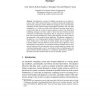Free Online Productivity Tools
i2Speak
i2Symbol
i2OCR
iTex2Img
iWeb2Print
iWeb2Shot
i2Type
iPdf2Split
iPdf2Merge
i2Bopomofo
i2Arabic
i2Style
i2Image
i2PDF
iLatex2Rtf
Sci2ools
161
click to vote
ATC
2008
Springer
2008
Springer
Scheduling for Reliable Execution in Autonomic Systems
Abstract. Scheduling the execution of multiple concurrent tasks on shared resources such as CPUs and network links is essential to ensuring the reliable operation of many autonomic systems. Well known techniques such as rate-monotonic scheduling can offer rigorous timing and preemption guarantees, but only under assumptions (i.e., a fixed set of tasks with well-known execution times and invocation rates) that do not hold in many autonomic systems. New hierarchical scheduling techniques are better suited to enforce the more flexible execution constraints and enforcement mechanisms that are required for autonomic systems, but a rigorous foundation for verifying and enforcing concurrency and timing guarantees is still needed for these approaches. The primary contributions of this paper are: (1) a scheduling policy design technique that can use different decision models across a wide range of systems models, and an example of how a specific (Markov Decision Process) decision model can be a...
Related Content
| Added | 12 Oct 2010 |
| Updated | 12 Oct 2010 |
| Type | Conference |
| Year | 2008 |
| Where | ATC |
| Authors | Terry Tidwell, Robert Glaubius, Christopher D. Gill, William D. Smart |
Comments (0)

